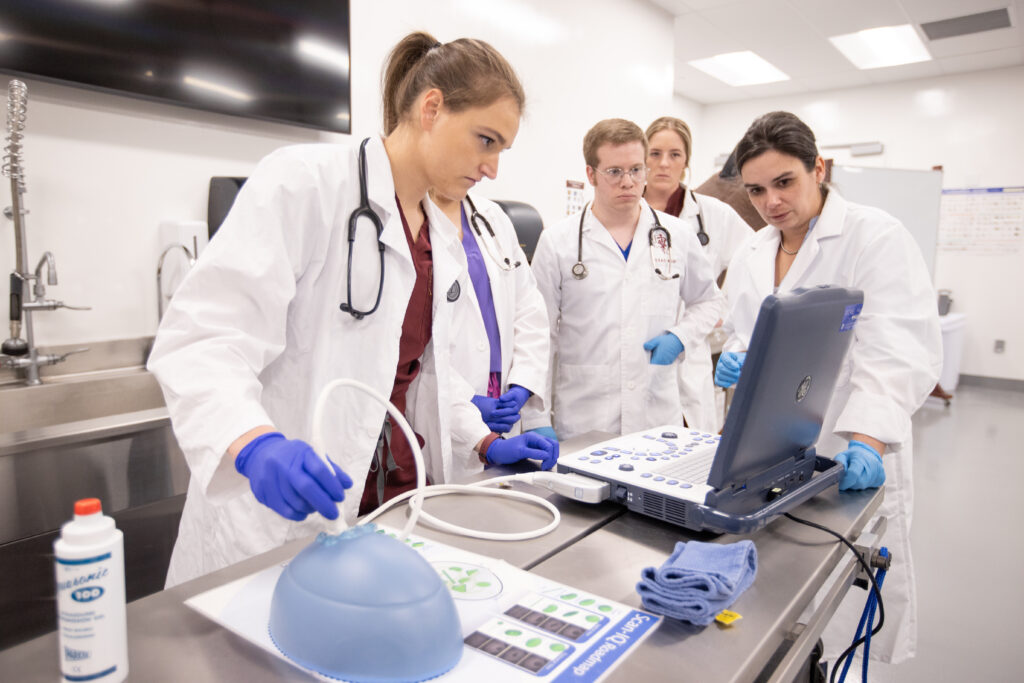Bringing 100+ Years Of Veterinary Educational Excellence To The Texas Panhandle
Story by Dr. Kelli Beavers, Texas A&M University Clinical Assistant Professor of Equine Veterinary Education, Canyon campus

Canyon, Texas, is home to many great things — Palo Duro Canyon State Park, the epic drama TEXAS, the largest historical museum in the state, and Texas A&M’s Veterinary Education, Research, & Outreach (VERO) program, which brings more than 100 years of veterinary medical excellence to the Texas Panhandle Plains.
VERO was established in 2009 to address rural Texas’ continual need for well-trained veterinarians skilled in the care of both large and small animals.
One of the ways we address this need is with our 2+2 Doctor of Veterinary Medicine (DVM) program, which allows up to 18 Aggie veterinary students to spend the first two years of their veterinary education at VERO before heading to College Station for their third and fourth/clinical years.
Classes are taught by a team of 15 veterinary clinical educators who are dedicated to making sure students receive the highest quality veterinary education available in the state.
Our 2+2 students learn from the same curriculum that’s taught to their peers in College Station but with the benefit of smaller, more close-knit class sizes and lower student-to-teacher ratios, as well as greater proximity to rural Texas communities, dairies, and feedlots.
This allows the educational team to develop student-teacher relationships in which we understand each student’s career ambitions and goals so that we can start helping them work toward achieving those goals earlier.
The help we provide takes many forms.
Our faculty have helped students identify mentorship opportunities in the Panhandle community and find opportunities outside the curriculum that allow them to learn more about an industry they’re considering for their career. We even incorporate learning opportunities specific to rural veterinary medicine and the Texas Panhandle’s farming and ranching industries’ needs into the DVM curriculum.
We still have the same courses with the same learning outcomes and objectives as those in College Station, but, given that our group size is smaller, we often can add some unique hands-on models or incorporate extra stations into labs at VERO.
One of the hands-on experiences we offer is the opportunity to work on realistic animal teaching tools called SynDaver® models. In addition to looking realistic, these models have a “pulse” and are life-sized with correct anatomy. Our students work on both dog and horse SynDaver® models, which allows them to gain experience and confidence in a low-risk, but still realistic, practice setting.
Another advantage of the 2+2 program is the opportunity to live in the Panhandle Plains region long enough for it to feel like home. Our students get to experience the exceptionally friendly culture and welcoming community while learning about the importance of agriculture to the area. They quickly learn that it’s rare to run into someone who doesn’t have a direct or indirect tie to the farming and ranching industries.
VERO’s partnership with West Texas A&M University (WT) is instrumental in making the Panhandle feel like home and in the community’s support of our students. They’ve been kind enough to include us in their campus culture, which makes both students and faculty feel like part of both the WT family and the Aggie family.
In addition to fostering a sense of belonging, our 2+2 DVM program empowers us to complete our vision of serving every Texan every day by emphasizing the unique opportunities and strengths available in the Texas Panhandle while training highly qualified and motivated students in the skills needed to serve the region.
“Going to school in the communities you plan to serve is an excellent way to make connections with local veterinarians and industry leaders in the area prior to graduation,” said fellow VERO faculty member Dr. Yvonne Wikander. “It opens doors into opportunities students might not otherwise consider.”
We want to see everyone who comes through the VERO program succeed. We invest a lot into our students and their success, and I can honestly say we couldn’t be more proud of our VERO students and their hard work. We look forward to following their continued successes in their veterinary careers.
For more information on VERO, visit vetmed.tamu.edu/vero, and for more information on the DVM program, visit futureaggievet.tamu.edu.


